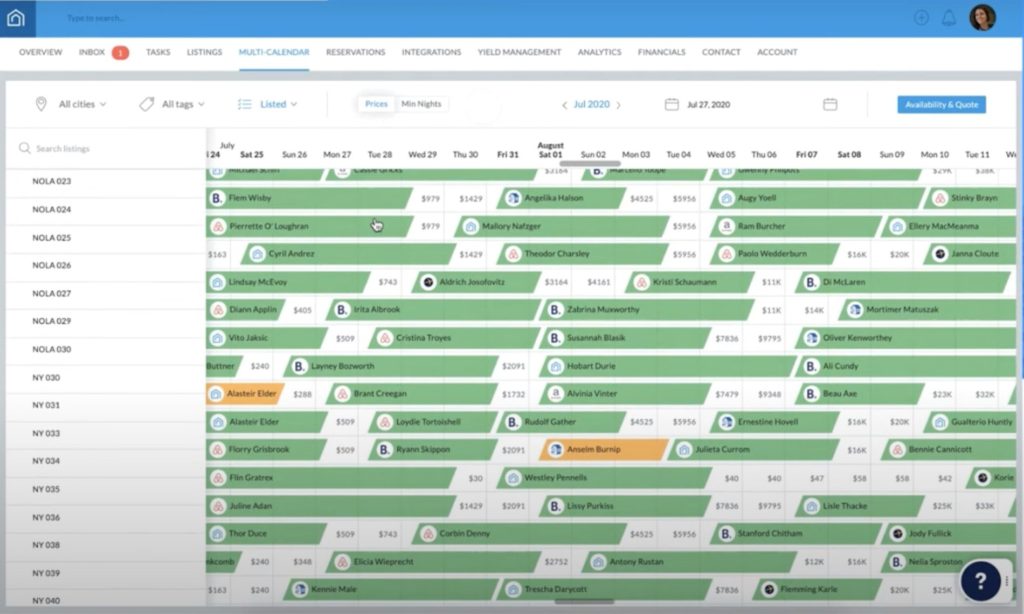In the competitive landscape of vacation rentals, vacation rental property owners face the decision of where to list their properties. This article explores the advantages and disadvantages of prominent platforms like Airbnb, VRBO, Booking.com, and the option to book directly with the property owner, and we’ll discuss the differences they have in payment plans, cost, refund policies, customer support, and liability coverage for hosts and owners.
Airbnb
Due to the different marketing strategies and company policies, there are a lot of differences between the different booking platforms for vacation rentals. Having dominated the competition and strong-armed local regulations, Airbnb has likewise begun to suffer from its own success. It was once an adventurous option for young travelers looking to see the world without going broke. Now it’s a commercialized, unregulated mess.
Pros
- Low Fees: Airbnb boasts lower fees compared to VRBO and Booking.com, including credit card payment processing fees.
- Host Insurance (Aircover): Offers up to $3 million in damage protection, although additional liability coverage may be required.
- Guest Identity Verification: A comprehensive system verifying guest details enhances security and trust.
Cons
- Guest-Centric Approach: Airbnb tends to favor guests in dispute resolution, many times refunding substantial amounts for minor issues.
- Review Policy: The platform is known for not removing guest reviews, even when hosts provide evidence of policy violations.

Comparison of Platforms
Payment Plans
- Airbnb requires full payment at booking.
- Booking.com charges the full amount 30 days before check-in.
- VRBO allows owners to integrate their payment processor with customizable payment schedules.
- Direct booking with the owner usually involves a two-part payment, with a security deposit charged closer to the check-in date.

Service Fees & Cost
- Airbnb service fees are 10-15% higher than direct booking.
- Booking.com is consistently more expensive, approximately 13% higher than direct booking.
- VRBO charges a 5% service fee, calculated as a percentage of the total reservation, excluding taxes.
- Direct booking usually offers the most cost-effective option without additional service fees.
Cancellation Policies
- Airbnb and VRBO provide flexible cancellation policies with varying refund percentages.
- Booking.com allows free cancellation until 30 days before arrival, with the total price charged if canceled within 30 days.
- Direct booking often offers the best flexibility, with full refunds for cancellations made well in advance.

Customer Support
- Airbnb and Booking.com offer 24/7 support through various channels.
- Direct booking provides direct access to the property owner, ensuring quick communication and personalized assistance.
Host Insurance & Liability
- Airbnb and VRBO provide liability coverage, with Airbnb offering up to $1 million.
- Booking.com lacks damage coverage for guests or hosts.
- Direct booking may involve a security deposit returned upon meeting specific conditions.

Now that we have compared Airbnb vs Booking.com vs VRBO, you can make a much better decision on how you want to book your next vacation rental. In order to cast a wide net, you could use a vacation rental management software and publish your property on all the most popular platforms.
Choosing the right platform depends on your priorities. Airbnb offers comprehensive insurance and customer support but requires full upfront payment. Booking.com suits those wanting to delay payment but comes with higher rental rates. Direct booking offers cost-effectiveness, direct communication, and favorable cancellation policies, albeit with a security deposit. Property managers may benefit from using vacation rental management software to maximize exposure across platforms.



